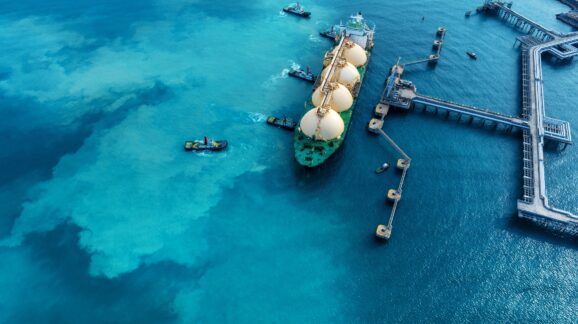New Liquefied Natural Gas ruling makes Jones Act even more unreasonable

Photo Credit: Getty
A new Customs and Border Patrol (CBP) decision will make compliance with the Jones Act even more onerous for natural gas producers.
The Jones Act, a law that is over 100 years old, requires all ships used to move goods from one US port to another be US-owned, -built, -crewed, and -registered. This makes it impractical to ship goods from one US port to another because the amount of ships that meet these requirements is incredibly limited. Just 93 vessels worldwide were Jones Act compliant in January 2023, according to Statista. These problems are compounded for Hawaii, Alaska, and Puerto Rico because of their geography (e.g. distance, accessibility).
The law causes particular problems for the transportation of Liquefied Natural Gas (LNG). There is currently not a single LNG tanker that meets Jones act requirements. There are some smaller vessels in compliance, including barges, but nothing that can move LNG at scale. This means that US terminals can export LNG to other countries, or receive imports from other countries, but cannot receive LNG from other parts of the United States.
The Jones Act hampers the transportation of LNG domestically and makes it difficult for necessary energy to reach Americans. Different parts of the country even look to foreign sources of LNG instead of domestic sources because of the Jones Act. It is actually cheaper for New England to import its LNG from overseas than it is to purchase it domestically, in large part due to Jones Act restrictions. The US is the world’s largest natural gas producer yet Americans can’t realize many benefits arising from this incredible production.
As winter approaches, it is worth noting how the Jones Act can undermine keeping Americans warm. As an example, when it gets really cold in the winter, and New England desperately needs natural gas for heat and electricity, an LNG import terminal in Massachusetts cannot receive domestically produced LNG from an export terminal in just down the coast, such as one in Maryland. Instead that capacity would need to be received at the terminal in Canada and then transported to New England.
New England states could also buy their natural gas from another country and have it imported directly through a terminal in Massachusetts. Both of these options are inefficient work-arounds that exist only to comply with the Jones Act.
From the perspective of the producer, because their gas cannot be moved from one US port to another, they will need to look to pipelines. If they lack a pipeline connection to a prospective customer, exports would be their best bet.
There’s now another issue for domestic LNG exporters and it deals with using LNG tankers that are not Jones Act compliant, which as stated earlier, is every LNG tanker. For the sake of simplicity, these tankers will be referred to as “foreign LNG tankers.”
When a foreign LNG tanker arrives at a US terminal and receives an LNG cargo, it might move to a second terminal along the same coast, adding to its existing LNG cargo before heading to Europe or Asia to drop off the LNG cargo. No US goods are delivered between US ports by a foreign flagged ship in this situation, the first cargo is just present during the loading of the second. But that’s not good enough.
Following a new Customs and Border Patrol decision from November 14, it appears that a foreign LNG tanker in the example above won’t be able to pick up the second cargo.
When the LNG tanker picks up its second cargo, small amounts of natural gas are vented through fuel lines. This venting, called “boil off,” is a safety measure. According to the Customs and Border Patrol decision, since this process involves small amounts of the vented gas reaching shore, the tanker has transported cargo to the second location in violation of the Jones Act. It doesn’t matter that the venting is due to safety reasons. The Jones Act doesn’t provide exceptions for safety measures.
As the holding section of the decision reads, “The proposed transportation of Liquefied Natural Gas from Port A to Port B, a portion of which will be released as vapor for safety reasons at Port B, which will be directed to liquefaction trains for recapture ashore, by a non-coastwise-qualified vessel violates the Jones Act, 46 U.S.C § 55102.”
Essentially, this ruling precludes the loading of a second cargo by LNG tanker’s servicing US terminals. This decision only serves to enhance the inefficiencies created by the Jones Act.
As it is, the Jones Act should be in the crosshairs of legislators. At a bare minimum, Congress should clarify that this venting or any other safety measure at a second port doesn’t violate the Jones Act.